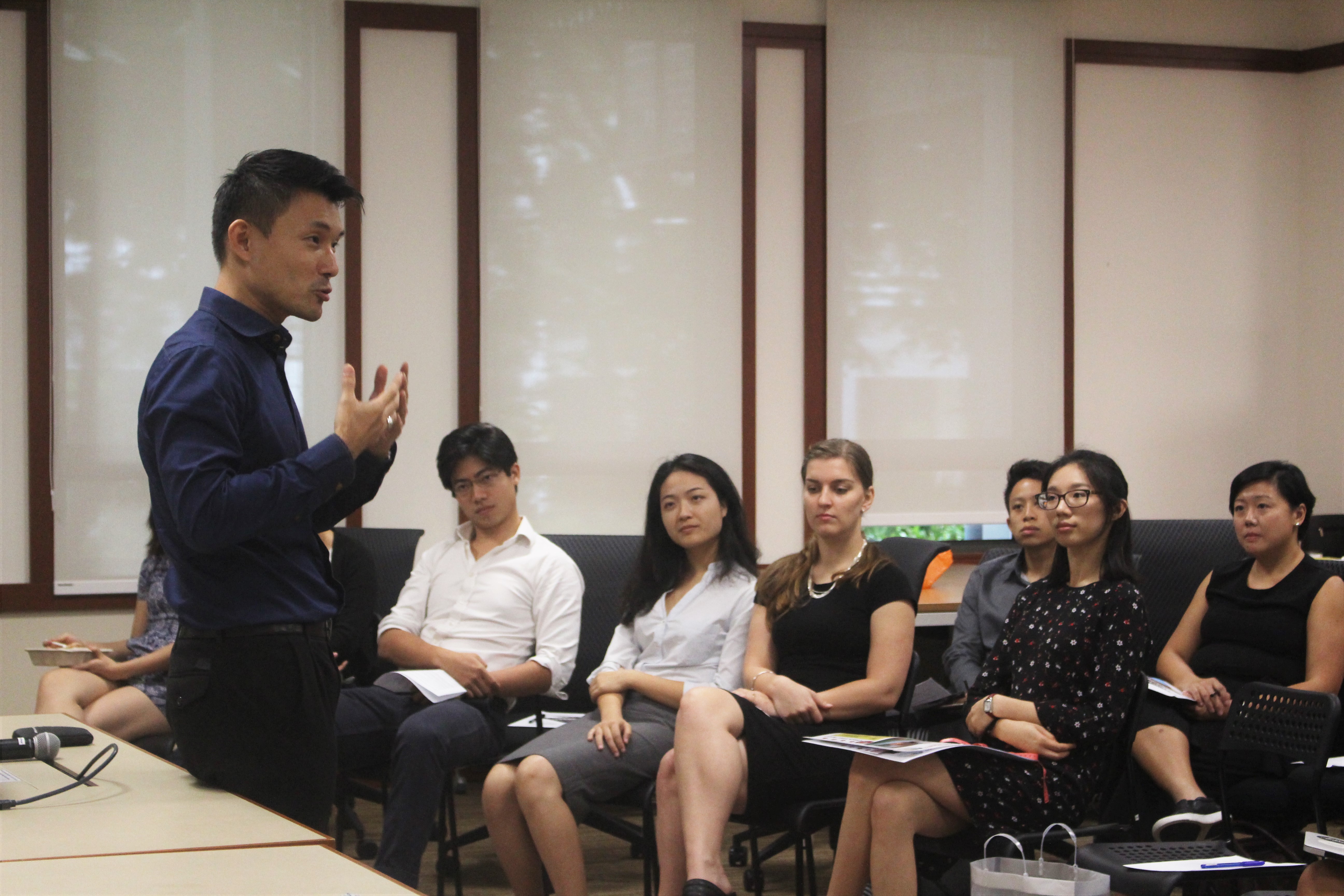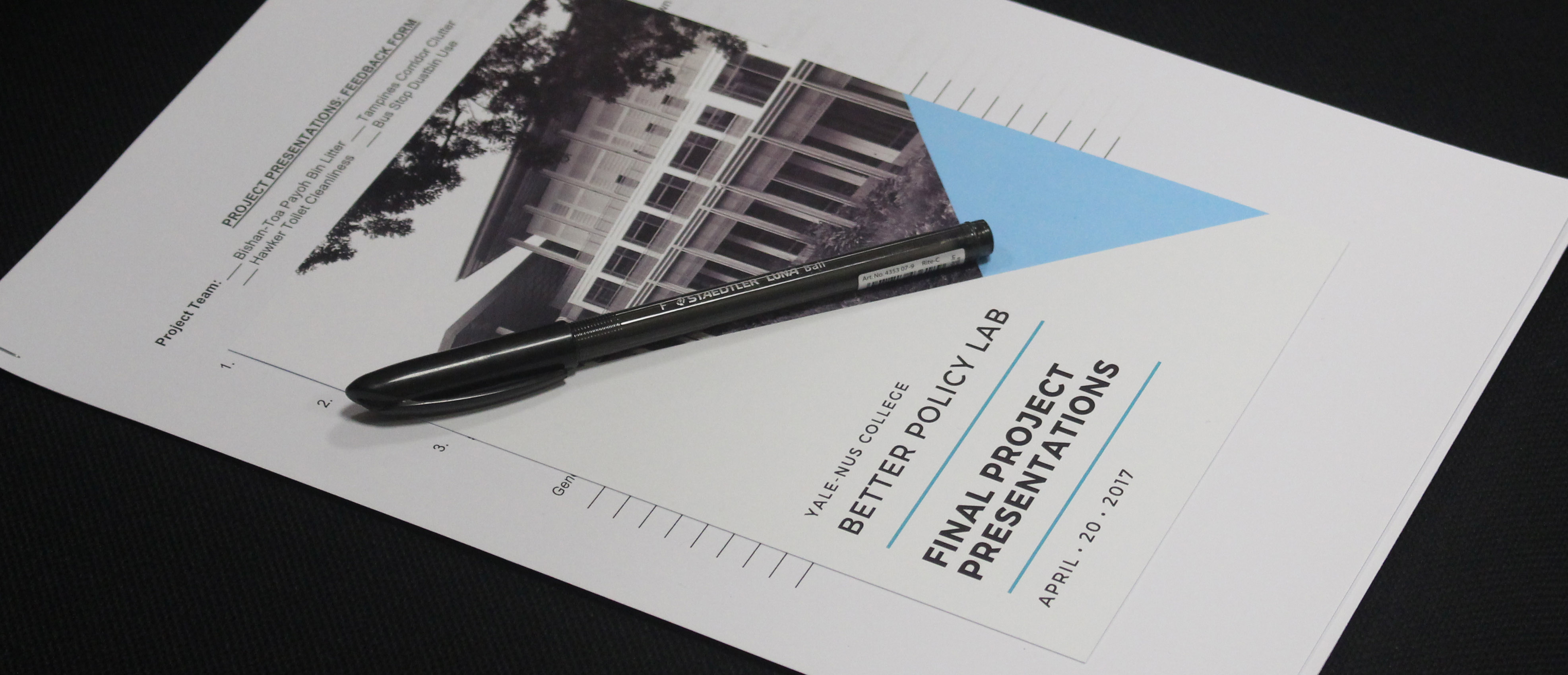Dirty hawker toilets, litter at bus stops & corridor clutter: applying psychology to policymaking

Mr Baey shares with students of the ‘Better Policy Lab’ some of his personal experiences with behavioural insights.
At the end of last semester, some students had the opportunity to present their innovative solutions to everyday problems to Member of Parliament and Parliamentary Secretary, Ministry of Culture, Community and Youth Baey Yam Keng as part of their final project assessment. This was part of the ‘Better Policy Lab’ class taught by Assistant Professor of Psychology Jean Liu.
In the laboratory class, students had the opportunity to test theoretical hypothesis, collect data through fieldwork and analyse the findings. The class aimed to equip students with the skills to apply psychology to policymaking. Dr Liu designed the course to address the needs of students after hearing many psychology graduates lament about how the discipline was inapplicable to their careers.
“Over the years, I’ve encountered a fair number of psychology graduates who tell me how they have never touched psychology since graduating. Psychology graduates go out into every sector – human resources, civil service, advertising, you name it. That they find their studies irrelevant to their work is a wasted opportunity, and is something I’ve been concerned about for a very long time,” Dr Liu reflected.
She explained, “One problem is that psychology is usually taught as a basic science, and students don’t get enough experience applying psychology to optimise outcomes. In fact, psychology is relevant to almost every field and problem set that you can think of!”
For Joceline Yong (Class of 2018) who is majoring in Psychology, it was precisely such misconceptions about psychology that motivated her to take the class.
“I was interested in this class as it provided an opportunity for real-life practical application of psychological theories. Some people think that psychology is limited to the treatment of mental health disorders, but taking this class has helped me to share more examples of how psychology can, in fact, be applied to many different areas, including public policy,” she shared.
Each group was tasked to complete an experiment in open community spaces to address a public issue. Joceline and her team explored ways and possible policies to reduce the amount of litter at bus stops.
“We decided to test an initiative that has been implemented in other major cities, which involves pasting stickers in a trail towards dustbins, in order to make the locations of the dustbins more obvious to commuters, thereby nudging them to follow the trails and dispose of their trash appropriately,” she explained.
“We had the chance to work with various stakeholders such as the Land Transport Authority and National Environment Agency. It was interesting to learn about the perspectives they had when we shared our ideas with them, as well as working with them within constraints such as a short timeframe and limited resources to carry out our project.”
For their final presentation, the students also presented their findings to representatives from the various agencies such as the town councils and the Ministry of Water and Environment Resources. The presentations demonstrated the potential that behavioural insights had for future policy making by these stakeholders.

According to Payal Lal (Class of 2017), the class is centred on this concept of “nudges”, or choice architecture – the principle that the way in which choices are presented to us influences our decisions.
“Nudge is often seen in marketing tactics – the most common example being of expensive items in grocery stores being shelved at eye level. Increasingly, governments are using it to encourage more positive behaviours from citizens. Through our projects in this class, we had to find the type of choice architecture that nudged people to behave in a particular way,” she noted.
For Wu Junn Kit (Class of 2018), the application of theory outside the classroom was something he greatly appreciated about the class. Junn Kit and his team worked with the Bishan Toa-Payoh Town Council to reduce the amount of inappropriately thrown litter around bins in the Toa Payoh area.
“I enjoyed being able to bring my theoretical knowledge of psychology and apply it in the real world, where there was a possibility of tangible effects. Collecting data in a real world scenario was also very different from normal ‘lab’ conditions, where everything tends to be well-controlled, as the real world has so much more ‘noise’ that need to be accounted for. Being able to see the complexity of it was intriguing,” he reflected.
The growing interest in behavioural insight across different fields led Dr Liu to develop such a class in Yale-NUS, where students and faculty are constantly engaged in thinking and researching across disciplines.
“This is a new approach by the government, where they actively seek to apply the best of the behavioural sciences to public policy, cutting across a variety of disciplines. This plays to the strengths of Yale-NUS because behavioural insights require a broad package of skills (e.g., graphic design, communication). I knew that a course on behavioural insights would be a good fit for Yale-NUS students, and started planning the syllabus,” Dr Liu remarked.
For Payal, who has been involved in various tech startups in Singapore, Israel and San Francisco, this class helped her realise “how little nudges and design changes can push huge changes in user behaviour that companies otherwise spend a lot of time and money trying to do.”
“Not only can it be used to solve small problems that companies often face (such as how can I get my customers to finish checking out their shopping cart on my website), it can also be used to solve larger problems (how can I ensure that fewer people open spam emails and get caught up in online scams). In the future, I hope to work in a space that uses nudges and behavioural insights to solve some of the bigger problems that the tech industry and the society as a whole changes in areas such as cybercrime and education,” Payal shared.
Outside of the class, Payal was also part of a winning team that took home the Behavioural Exchange 2017 Practitioner’s Award for a project on reducing scams via internet banking platforms. She and her team of three Yale-NUS students and a NUS student competed against professionals and specialist behavioural insights companies to develop solutions to minimise online love scams by increasing awareness of such scams among potential victims, based on principles from behavioural insights. The award recognised the original and effective application of behavioural insights to policy challenges.
Payal was not the only student who continued to apply what she had learnt from the class to other aspects of her life beyond the project. Apart from winning the competition, Dr Liu observed that students also started extending what they had learned to areas outside the course”.
“Some wanted to help improve the admissions process at Yale-NUS while others told their job interviewers how they could use behavioural insights to help in their future jobs,” said Dr Liu
In light of the positive response to the class by both students and external stakeholders, Dr Liu will continue to teach this class with new opportunities. “More government agencies have expressed an interest in what the students are doing so hopefully that would lead to a greater variety of projects offered,” she noted.





